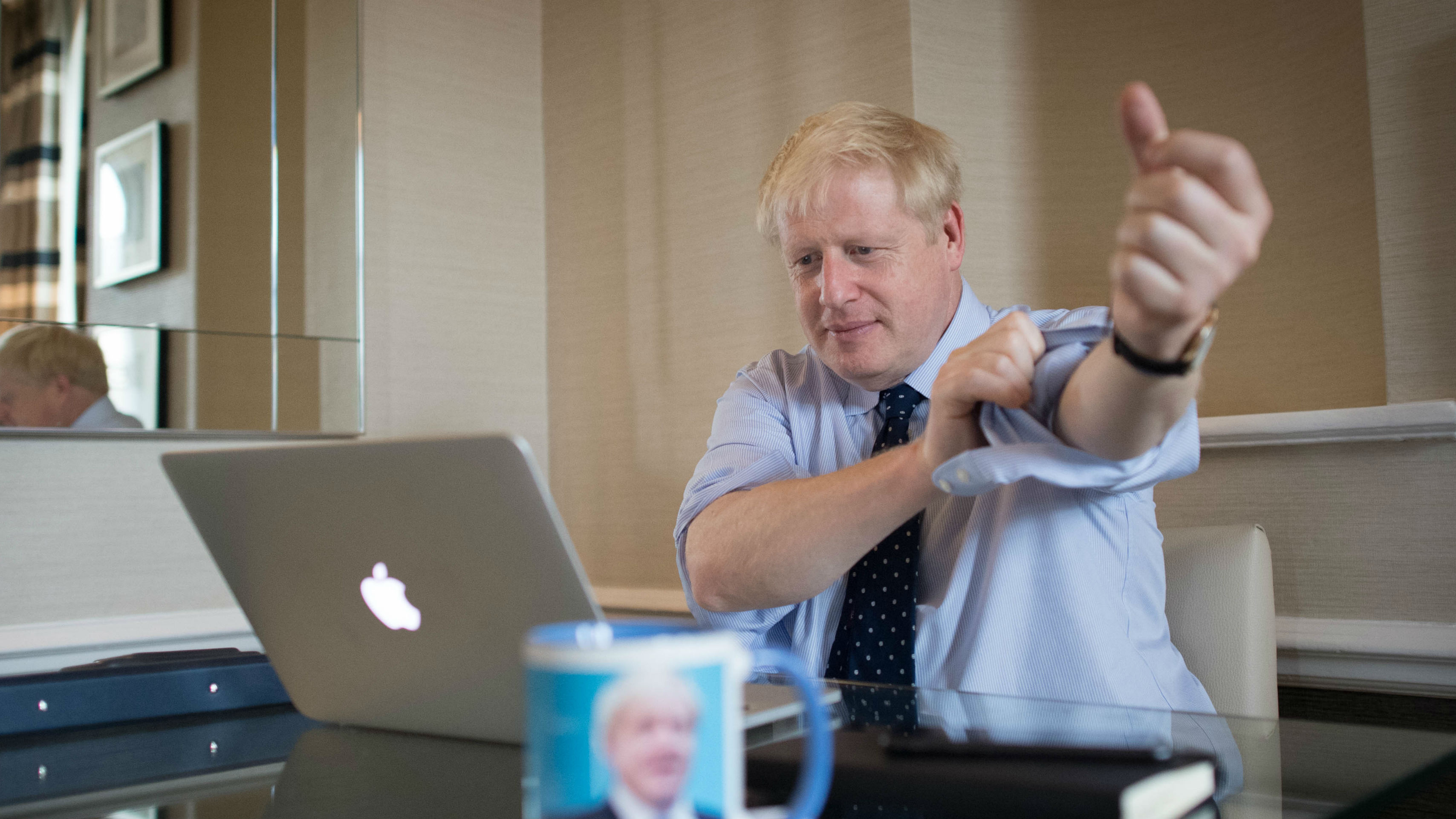Boris Johnson’s alternative to the Irish backstop
‘Two borders, for four years’ proposal sent to European Commission

A free daily email with the biggest news stories of the day – and the best features from TheWeek.com
You are now subscribed
Your newsletter sign-up was successful
Boris Johnson has sent a formal legal text outlining his plan for the post-Brexit Irish border to Brussels.
The prime minister has been under pressure to find an alternative to the deeply unpopular “Irish backstop” that was rejected by MPs three times earlier this year, ultimately forcing Theresa May out of No. 10.
He is giving the EU until the weekend to reopen negotiations or accept the responsibility for a no-deal Brexit.
The Week
Escape your echo chamber. Get the facts behind the news, plus analysis from multiple perspectives.

Sign up for The Week's Free Newsletters
From our morning news briefing to a weekly Good News Newsletter, get the best of The Week delivered directly to your inbox.
From our morning news briefing to a weekly Good News Newsletter, get the best of The Week delivered directly to your inbox.
So what is his plan?
According to The Telegraph’s Europe editor Peter Foster, the whole of the UK would leave the EU customs union at the end of the transition period in 2021 and move into a Free Trade Agreement (FTA) with Europe.
However, Northern Ireland would remain aligned to all single market rules for agriculture and industrial goods until 2025.
The proposals have been dubbed “Two borders, for four years” as they would create two borders between Northern Ireland and the Republic of Ireland, as well as across the Irish Sea between Britain and Northern Ireland.
A free daily email with the biggest news stories of the day – and the best features from TheWeek.com
At the end of the four years, Northern Ireland would be able to choose between continuing with the arrangement or accepting a harder border with Ireland by adopting the same trading arrangements as the rest of Britain.
Customs checks between Northern Ireland and the Republic would be required for the four-year period, although they would be set back from the border. The “high-tech customs border” will involve “shipments tracked in real-time via cameras, GPS and other technology”, Foster writes.
In the letter sent to European Commission President Jean-Claude Juncker, Johnson says: “This Government wants to get a deal done, as I’m sure we all do. If we cannot reach one, it would represent a failure of statecraft for which we would all be responsible.
“Our predecessors have tackled harder problems: we can surely solve this one.”
How is it different from the original Irish backstop?
May’s backstop was intended to be a back-up plan, or position of last resort, to be implemented if a permanent trading arrangement was not agreed with the European Union during the 21-month transition period after the UK quit the EU with a deal in place. The aim was to maintain an open border on the island of Ireland, with few restrictions for goods and services crossing the frontier between the Republic and Northern Ireland.
The goal of the backstop is “to protect the 1998 Good Friday Agreement to end the Northern Irish ‘troubles’ while ensuring the integrity of EU law”, says the Financial Times.
At present, goods and services are traded on the island between the UK and the Republic with few restrictions. As both countries are currently part of the EU single market and customs union, products do not need to be inspected for customs and standards.
The EU initially suggested leaving Northern Ireland alone in the EU single market and customs union to avoid a hard border. But May opted to keep all of the UK in a customs border with alignment to the EU if a workable arrangement could not be agreed during the transition period, explains the Telegraph’s Foster. One fear among Brexiteers was that, under May’s plan, the UK could not unilaterally opt out of the Irish backstop if the EU refused to agree to an alternative solution.
–––––––––––––––––––––––––––––––For more political analysis - and a concise, refreshing and balanced take on the week’s news agenda - try The Week magazine. Get your first six issues free–––––––––––––––––––––––––––––––
Johnson’s deal takes Britain out on a hard FTA but leaves Northern Ireland partially behind in the EU single market, and he wants the EU and Irish government to agree to customs checks in advance, rather than during the transition period - so there is no need for the backstop.
He also says the Northern Ireland Executive and Assembly should have a chance to endorse the arrangements initially and then every four years, as well as be given extra funding to support the changes.
Will anyone agree?
Johnson has described his “final offer” on Brexit as a “fair and reasonable compromise”, but customs checks along two frontiers will be “highly controversial”, says The Times.
Accusing London of “chaotic management of Brexit”, Irish Foreign Minister Simon Coveney said earlier in the day: “If the reports we are hearing are true, it doesn’t look like the basis for an agreement.”
Irish PM Leo Varadkar also criticised the proposals, saying: “People here don’t want a customs border between north and south and no British government should seek to impose customs posts against the will of the people on the island of Ireland.”
Democratic Unionist Party (DUP) leader Arlene Foster has backed the plans, arguing that it is better than previous ideas for the Irish border. “Northern Ireland was going to be in a different customs union, we were going to be in separate regulations without any democratic say,” she said.
“I think it’s important that we now try and get a deal that is good for Northern Ireland as well as the rest of the UK.”
However, the plans are expected to face “fierce opposition” from EU leaders, who will have to give the UK “sweeping exemptions from EU customs rules”, says The Telegraph. According to the newspaper, one senior EU official said: “If this is the final offer, then there is not a deal to be had.”
-
 What to know before filing your own taxes for the first time
What to know before filing your own taxes for the first timethe explainer Tackle this financial milestone with confidence
-
 The biggest box office flops of the 21st century
The biggest box office flops of the 21st centuryin depth Unnecessary remakes and turgid, expensive CGI-fests highlight this list of these most notorious box-office losers
-
 The 10 most infamous abductions in modern history
The 10 most infamous abductions in modern historyin depth The taking of Savannah Guthrie’s mother, Nancy, is the latest in a long string of high-profile kidnappings
-
 How corrupt is the UK?
How corrupt is the UK?The Explainer Decline in standards ‘risks becoming a defining feature of our political culture’ as Britain falls to lowest ever score on global index
-
 The high street: Britain’s next political battleground?
The high street: Britain’s next political battleground?In the Spotlight Mass closure of shops and influx of organised crime are fuelling voter anger, and offer an opening for Reform UK
-
 Biggest political break-ups and make-ups of 2025
Biggest political break-ups and make-ups of 2025The Explainer From Trump and Musk to the UK and the EU, Christmas wouldn’t be Christmas without a round-up of the year’s relationship drama
-
 ‘The menu’s other highlights smack of the surreal’
‘The menu’s other highlights smack of the surreal’Instant Opinion Opinion, comment and editorials of the day
-
 Is a Reform-Tory pact becoming more likely?
Is a Reform-Tory pact becoming more likely?Today’s Big Question Nigel Farage’s party is ahead in the polls but still falls well short of a Commons majority, while Conservatives are still losing MPs to Reform
-
 Asylum hotels: everything you need to know
Asylum hotels: everything you need to knowThe Explainer Using hotels to house asylum seekers has proved extremely unpopular. Why, and what can the government do about it?
-
 Meet Ireland’s new socialist president
Meet Ireland’s new socialist presidentIn the Spotlight Landslide victory of former barrister and ‘outsider’ Catherine Connolly could ‘mark a turning point’ in anti-establishment politics
-
 Believe it when AI see it: is this a deepfake turning point in politics?
Believe it when AI see it: is this a deepfake turning point in politics?Today’s Big Question AI ‘slopaganda’ is becoming a ‘feature’ of modern elections